Can pigs eat eggs? Feeding pigs can be tricky. People have a lot of opinions about what’s best for them. Whether or not you can feed your pigs eggs is one that comes up a lot. Eggs are a great source of protein, but they also have some negative effects. Let’s discuss the good and the bad sides of feeding your pigs eggs.
Contents
- What is Biotin and Why Is It Important?
- Avidin in Eggs
- Benefits of Pasture-Raised Pork
- How Can Raw Eggs Interfere with Biotin the Pig’s Body?
- Will An Occasional Raw Egg Hurt Pigs?
- Are Eggshells Safe for Pigs?
- Foods That Are Safe to Feed to Pigs
- What Not to Feed to Your Pigs
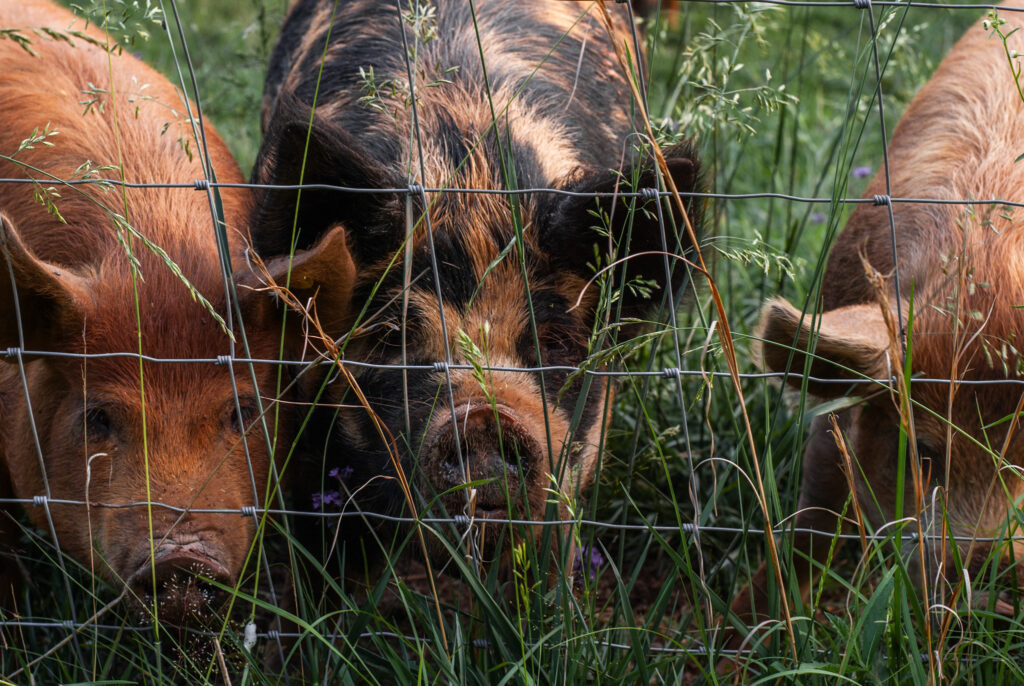
Feeding Pigs Raw Eggs
Feeding your pigs a large amount of raw eggs can cause a biotin deficiency. While they might love to eat raw eggs, they can have a lot of negative effects on the overall health of your pigs. Thats because biotin is a much needed vitamin that the body uses for a lot of different functions.
What is Biotin and Why Is It Important?
Biotin is a vitamin that’s really important for our bodies. It belongs to the B vitamins group and it helps us to turn food into energy. Biotin also helps to metabolize carbohydrates, amino acids, and fats in the body which help to build protein.
Biotin is good for the hair, skin, and nails, and it also helps the nervous system work like it should. You can get biotin in foods like eggs, nuts, raw sweet potatoes, and spinach.
Avidin in Eggs
Eggs have something called Avidin found in the egg whites. Avidin is a protein that can stick to the biotin, making it hard for the body to absorb.
If you eat raw egg whites, the Avidin will hold on to the biotin and prevent it from doing it’s job in your body.
This isn’t an issue most of us need to be concerned with. However, if you eat a lot of raw egg whites you could get a biotin deficiency.
Although, if you cook the eggs the heat will break down the avidin. It’s a good idea to cook your eggs to get the biotin benefits without the avidin interference.
Pig’s Diet
Pigs will get biotin in their diet through a combination of their feed and foraging, especially if they’re pasture-raised. It helps their metabolism, skin health, and nervous system function properly.
Some commercial farms include biotin in pig feed as part of a balanced diet to make sure the pigs have a good growth rates and overall health.
Often, people keep pet pigs like potbellied pigs and kunekune pigs. Domestic pigs like these will also need a feed that’s high in biotin.
When pigs are pasture-raised they can get biotin from a more natural diet. Foraging allows them to eat a more diverse diet and meet their nutritional needs.
Natural biotin-rich sources for pigs are plants, roots, and insects. A diet naturally high in biotin can lead to better-quality pork, with a richer flavor.
Benefits of Pasture-Raised Pork
Biotin content in pasture-raised pork can vary based on the pig’s diet and environment. Generally, pasture-raised pork is considered more nutritious due to their varied diet, their ability to exercise, and being raised in a more natural environment.
However, it’s hard to determine the specific biotin levels in pasture-raised pork because it can depend on a lot of factors like the pig’s age, feed, and farming practices.
If you want pork with a higher nutritional value, pasture-raised pork is often recommended for its more natural diet.
How Can Raw Eggs Interfere with Biotin the Pig’s Body?
Feeding pigs raw eggs may seem like a good thing since eggs are a great source of protein. I also raise 100 laying hens on my farm, so it seems natural not to let an abundance of eggs go to waste.
However, the avidin found in raw eggs will also bind with the biotin in the pig’s body just like ours. When it binds in the digestive system, the biotin is unavailable for the pig’s body to use. This will lead to a biotin deficiency which isn’t great for the pig’s health.
Biotin deficiency in pigs can cause a lot of problems, like poor growth, skin issues, hair loss, and hoof problems.
You can solve this issue simply by cooking the eggs before feeding them to your pigs. When I have an abundance of eggs, I give them a quick toss in the skillet before giving them to my pigs.
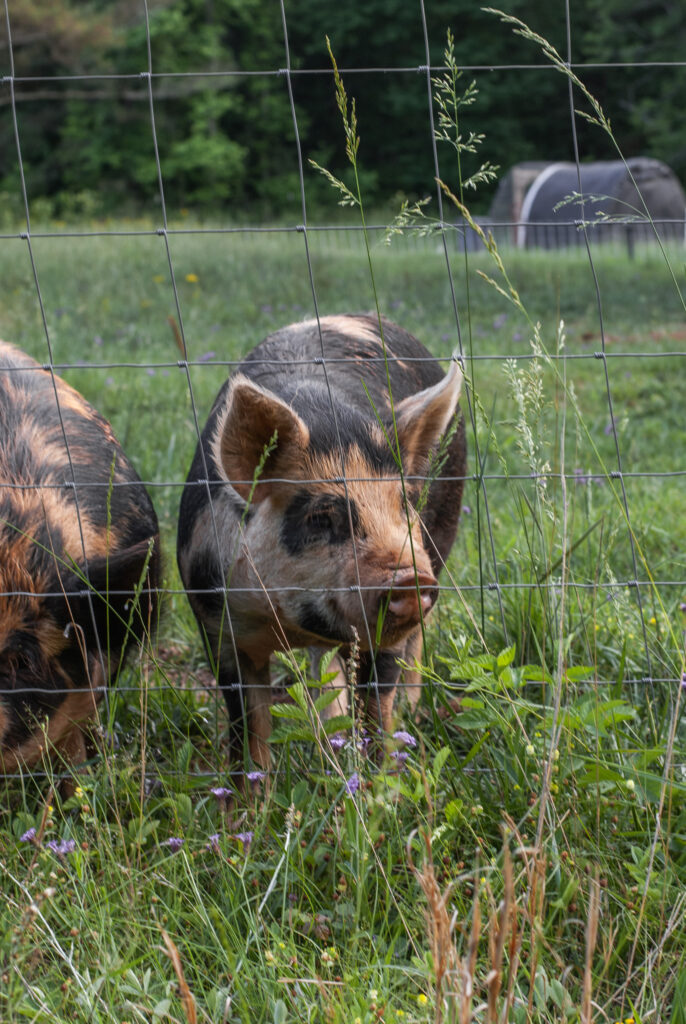
Will An Occasional Raw Egg Hurt Pigs?
So, can pigs eat eggs at all? Occasionally I will find a cracked egg in my coop. Usually, it’s one that a chicken stepped on or that fell out of our nesting boxes. I have no problem throwing it over to our pigs. They appreciate the little snack.
A small amount here and there isn’t going to hurt your pigs. However, feeding your pigs raw eggs daily will have an impact on their overall health. In fact, the egg yolk from a pasture-raised chicken is high in Omega-3 fatty acids and vitamin D.
If you have chickens, you’ll probably find yourself with more eggs than you can use or sell. To be on the safe side cook them and feed them to your pigs. It keeps the eggs from going to waste and is a great source of protein for the pigs. There’s been some research to support the benefits of feeding egg yolks to young pigs.
You can scramble eggs, boil them, or bake them. After cooking, mix them in with the pig’s feed.
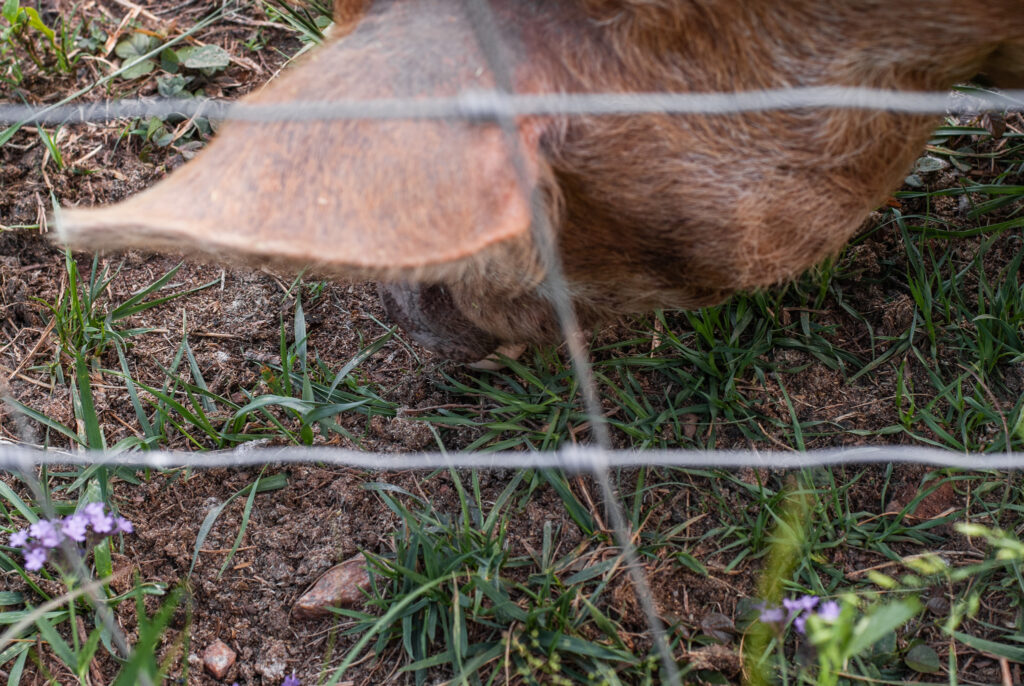
Are Eggshells Safe for Pigs?
Can pigs eat eggs whole with the eggshell? Yes, eggshells are safe for pigs. Eggshells are made of calcium carbonate, which is a major source of calcium. Pigs, especially pigs who are pregnant or nursing, need a lot of calcium to keep their bones strong. Even if they’re not pregnant, pigs need calcium to maintain good health.
The best way to feed them to the pig crush the egg shells into tiny pieces and mix them with the pigs’ feed. This will give the pigs a good source of calcium without having to add an extra supplement. It’s a natural way to boost their diet and decrease their farm waste.
You can also crust the eggshells and mix them into your soil or compost pile. They will help to replenish the calcium in the ground. In effect, this will benefit the plants and ecosystems on your farm.
Be sure to crush the eggshells so the sharp edges won’t damage the pig’s mouth or intestines.
Foods That Are Safe to Feed to Pigs
Pigs have often been portrayed as the garbage disposals of the barnyard. This belief is a common misconception. They will indeed eat a variety of foods, but that doesn’t necessarily mean that they should.
Here’s a rundown of things that are ok for pigs to eat.
Pig feed. These can be subdivided into grower and finisher feed. Soybean meal is great to add to the pigs’ diet because it provides them with a a lot of much needed energy.
Vegetables. Pigs love to eat fresh produce. You can feed them scraps straight from the garden. Some of the veggies my pigs love are green beans carrots, pumpkins, zucchini, squash, and leafy greens.
Fruits. Feeding your pigs fresh fruits like apples, bananas, berries, and melons will make them very happy. Be sure to remove any pits before feeding them.
Grains. Corn (including the cob) barley, and wheat are all fine for pigs and part of a healthy diet.
Dairy. Giving your pigs whey leftover from cheese making, or extra fresh milk from the family milk cow is a great way to decrease waste. However, don’t feed them a diet made up of a large amount of dairy products.
Alfalfa Hay. This is a perfect addition to a pig’s diet. Alfalfa hay provides fiber, protein, and other good nutrients. it’s especially good for pregnant or nursing pigs.
Nuts and Seeds. Pigs can eat things like sunflower seeds, unsalted peanuts, and unsalted almonds. My pigs love to pick the peanuts out of peanut hay.
Bread and cereals. Bread and pasta should be a fun treat for pigs. However, too much isn’t good for them. Feed them these things in moderation.
These are just a few of the things pigs enjoy eating. Read more about what pigs eat in my previous post.
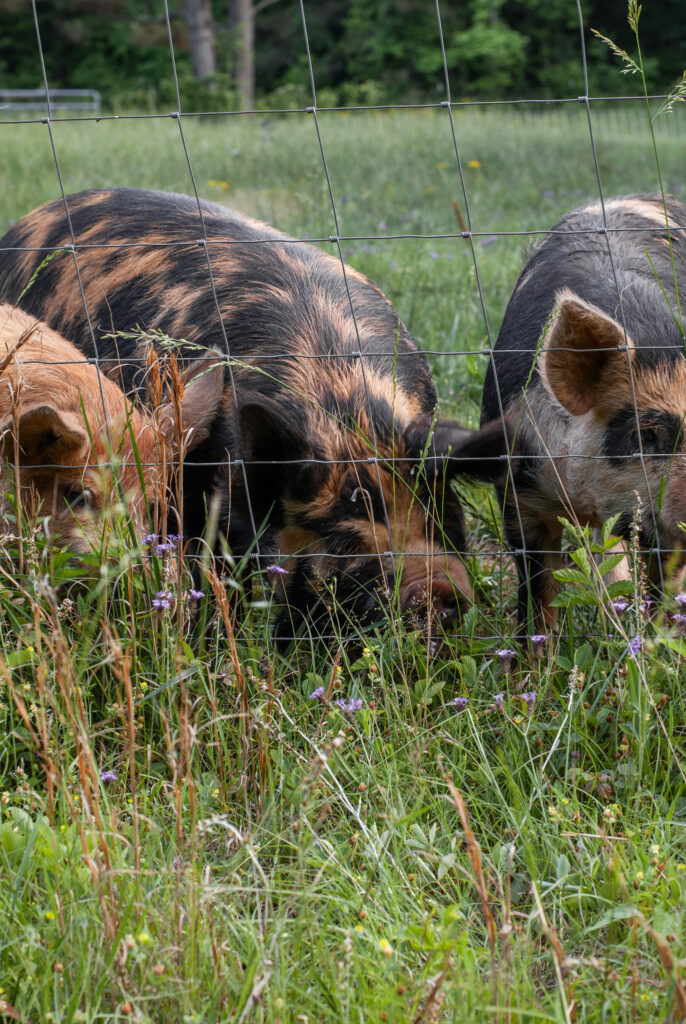
What Not to Feed to Your Pigs
Pigs can eat a lot of different foods, but there are definitely some things you should keep off the menu. While you can feed the pigs table scraps, here is a list of foods that pigs shouldn’t eat and why:
Chocolate: It’s toxic to pigs, just like it is to dogs. The caffeine and theobromine in chocolate can cause serious health problems in pigs, even in small amounts.
Raw Potatoes: Cooked potatoes are fine, raw ones, especially green potatoes, contain solanine, and can be harmful to pigs.
Onions and Garlic: These can damage a pig’s red blood cells and lead to anemia if eaten in large amounts. It’s best to avoid them entirely to be on the safe side.
Avocado: The skin and pit of avocados contain persin, which can be toxic to pigs.
Moldy or Rotten Food: Feeding pigs rotten or moldy food can lead to health problems. You should never feed pigs a rotten egg.
Mold contains toxins that make pigs sick, so always check food before feeding it to them.
Sugary Foods: While pigs might have a sweet tooth, too much sugar can lead to obesity and other health issues. Avoid feeding them candy, sugary drinks, or desserts.
Salty Snacks: Foods that have a lot of salt, like chips or salted nuts, can be bad for pigs. Too much salt can lead to dehydration and other health problems.
Raw Meat: Avoid feeding your pigs raw meat. It can contain trichinosis. Not only will it infect the pigs, but it can be transferred to humans too.
As always when you’re raising animals, monitor their behavior and reactions to specific foods. A good rule of thumb is to avoid any rotting food waste.
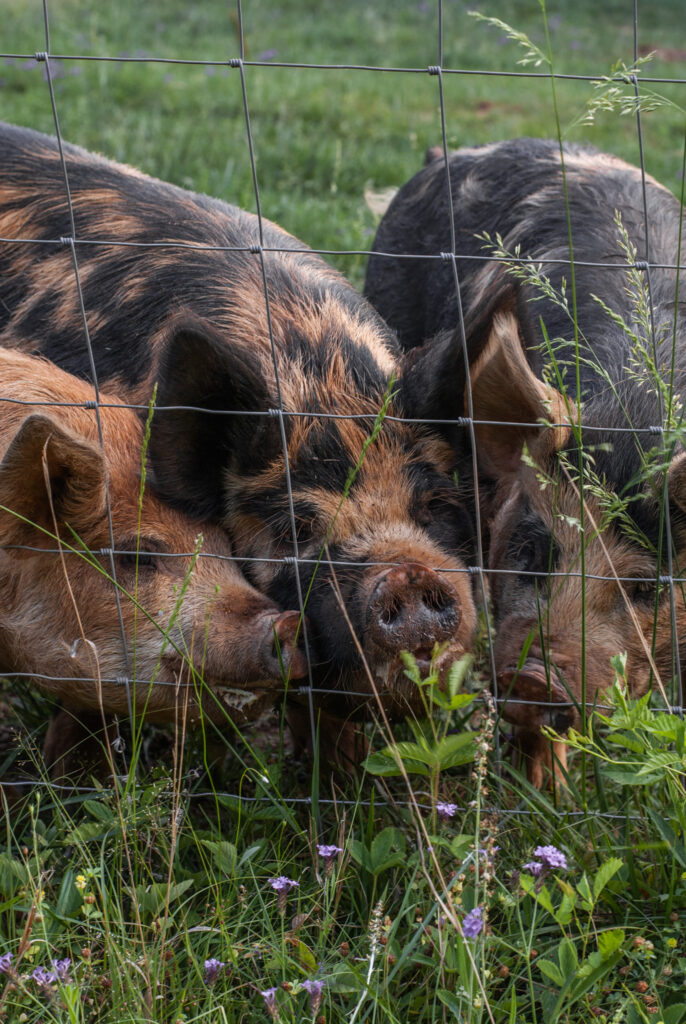
FAQs
How much food should I feed my pig?
The amount of food depends on the pig’s age, weight, and exercise level. Growing pigs need more food than mature pigs. A general guideline is 1-2 pounds of feed per 100 pounds of body weight.
Can pigs eat grass?
Yes, pigs can eat grass. It’s a good source of fiber and can be a part of their diet, especially for pasture-raised pigs. However, grass alone may not be enough essential nutrients to meet all their needs, so it should be supplemented with other foods.
Can pigs eat dog food or cat food?
Pigs would love dog or cat food, but it’s not the best for them. They’re designed for different animals and may not meet a pig’s nutritional requirements. You should stick to pig feed and appropriate food scraps.
Final Thoughts
Can pigs eat eggs? While pigs can technically eat raw eggs, it’s not the best idea because raw egg whites contain a protein called avidin, which can mess with the biotin in a pig’s body.
This could lead to some health problems like poor growth, skin issues, and hoof trouble if they eat too many raw eggs.
But if you cook the eggs first, the heat destroys the avidin, making it perfectly safe for pigs to enjoy.
So, if you’ve got extra eggs on the farm, feel free to cook them up and feed them to your pigs. It’s a great way to give them extra protein and nutrients without any risks.
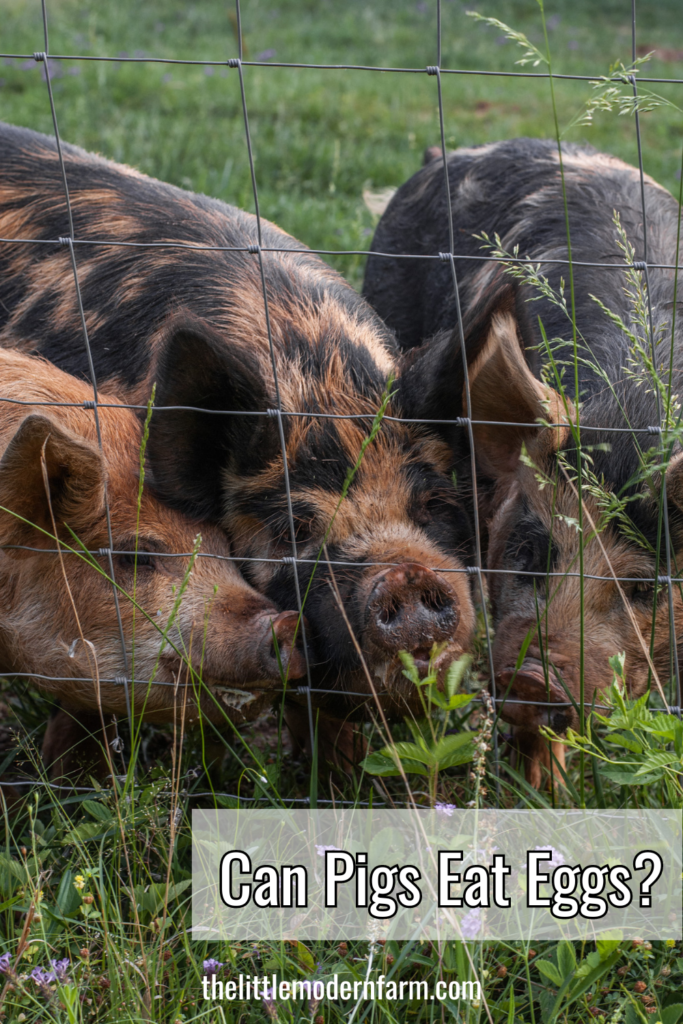
If you enjoyed this article on pigs, please share it! Thanks for visiting my farm.
More From The Farm
Figuring out the best bedding to use for pigs takes some trial and error. Choosing the right bedding is important for their comfort, health, and overall well-being. A clean and comfortable environment will make a world of difference in a pig’s life. Let’s look at the most popular bedding options out there to help you choose the best bedding for your farm….
[…] important consideration is Biotin deficiency in pigs. Feeding pigs raw eggs can decrease their Biotin levels dramatically, which can lead to health problems. Biotin is […]